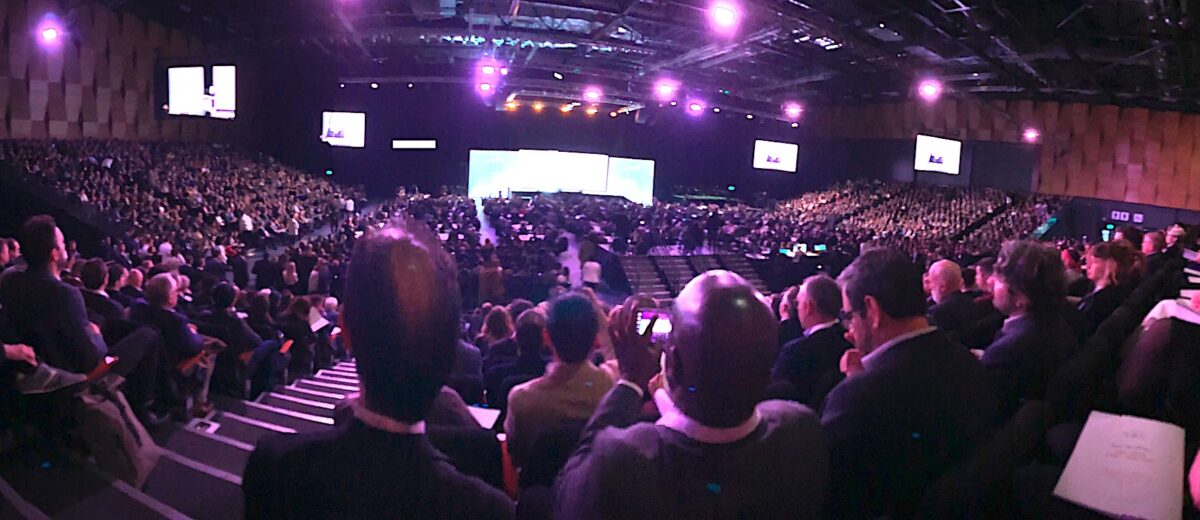Neville Chamberlain looked ominously down on us from his larger-than-life portrait above the mantelpiece in a posh London gentlemen’s club last Saturday. Chamberlain??!!
Frankly I was already out of my comfort zone in the elite neighbourhood of Buckingham Palace. But I had agreed to attend a gathering of invited leaders from all continents discussing strategy for discipling nations.
My discomfort was aggravated by developments in Munich and Washington over the previous days. The American-led international order based on international rule of law, respect for sovereign borders and institutions holding nations accountable was being demolished by the reckless Washington administration. Whereas since World War Two the free world had always looked to America for leadership, the stark reality now was that that role had sadly been abdicated.
Munich in Chamberlain’s time meant appeasement: a British prime minister, who was now staring at us from the wall, giving in to a dictator with plans for European domination. The result was tragic war.
Munich in our day will be remembered for an American president’s capitulation to a dictator with plans for reclaiming mastery of Central and Eastern Europe. Where will this betrayal of western values lead?
The jubilant mood in Moscow contrasts sharply with the stunned unbelief in Kyiv and among Europe’s leaders. Pro-Kremlin bloggers can’t believe the turn of events in which their war criminal president is being rewarded for his genocidal invasion and callous destruction of over a million Russian and Ukrainian lives. Brave and war-weary Ukrainians, all of whom have personally suffered and many of whom have lost loved ones, have had insult added to injury by an American president(!) blaming their country for starting the war(!!), and accusing their courageous leader of being a dictator(!!!).
Responsible?
Two days later, with a heavy heart, I headed eastwards across London to my next event. A politician friend had urged me to attend the Alliance for Responsible Citizenship (ARC), with Jordan Peterson, countless other speakers and 4000 international attendees. Promising ‘A better story’, the congress was an impressively-organised, well-moneyed, high-tech event with many TED-talk type presentations, panels, exhibitions and subsidiary events.
The list of speakers had forewarned me that my comfort zone would be further intruded upon. But I did want to hear the likes of Os Guinness, Ayaan Hirshi Ali and Niall Ferguson. It was my introduction to Peterson, the Canadian psychologist with a global following who describes himself as a classical liberal and traditionalist.
I warmed to his exposure of post-modern liberalism as the pursuit of hedonistic pleasure and self-fulfilment rejecting self-sacrifice on behalf of others: family, community and nation. And his insistence that history did have a narrative, that western society was shaped by the biblical narrative with sacrifice for the common good at its heart, resonated strongly with me.
Os Guinness’ crystal clear comments during a panel set the tone for much of the conference that we face ‘a civilisational moment’ when western society will either be renewed, lost or replaced. In a later talk, Os challenged a spell-bound audience to go beyond lip-service to a Judean-Christian legacy to personal commitment to God. Renewal of faith was indispensible, he argued, for meaning, belonging and purpose in life.
I should however have realised that the programme content would reflect the Anglo-American majority of attendees. Yet I was unprepared for the onslaught of speakers praising the Conservative American way, the new president and raw capitalism versus ‘socialism’ (clumsily confused with communism). Mike Johnson, the speaker of the US House of Representatives, linked by live video spoke of ‘the pendulum swinging back from the left to the centre(!)’ in a speech which sounded great but was rendered vacuous by the behaviour of his boss.
Cocooned
As in Munich the week before, America was centre-stage. Ukraine wasn’t even mentioned. We were cocooned in London’s gigantic ExCel centre from the tragic realities unfolding on the world stage. With the notable exception of New York Times writer David Brooks: his warning that the current presidential wrecking spree could cause irrepairable damage trod on a few toes.
I had hoped the recently-converted Ayaan Hirshi Ali would also bring sanity to the current crisis. But my heart sank when she began championing nationalism as opposed to transnational institutions such as the UN and the EU. Nationalism did not start wars, she claimed, echoing far-right politicians!
Dear Ayaan, I wanted to say, can’t you see that nationalism results in the big guys dominating the little guys, exactly as is happening right now in the Saudi Arabia talks? That its philosophy is ‘might is right’? Have you already forgotten the big lesson of World War Two when American-led initiatives set up an international order of institutions based on values of justice, peace, rule of law, and solidarity, to hold rogue nations accountable? And to prevent such war from ever happening again? Don’t you see that nationalism is self-seeking and isolationist, ignoring the common good, the very fault this conference found in post-modern liberalism?
There’s a more mature way than competition, independence and self-assertion. And that’s collaboration, interdependence and mutuality, the original vision for European integration.
And, yes, there is a better story to tell. Snippets could be heard this week despite the static. But it’s not a white, Anglo-American, conservative, capitalist, Christian nationalist story attempting to turn the clock back to ‘Christendom’.
Jesus also trod on the toes of the nationalists of his day when he told that better story, the one about the Good Samaritan. Today he’d probably shock us by talking about the Good Palestinian. Jesus himself summed up the law in the twin command to love God and neighbour. Whether Mexican or Canadian, Ukrainian or Russian, Israeli or Palestinian.
That’s a better story.
Till next week,



